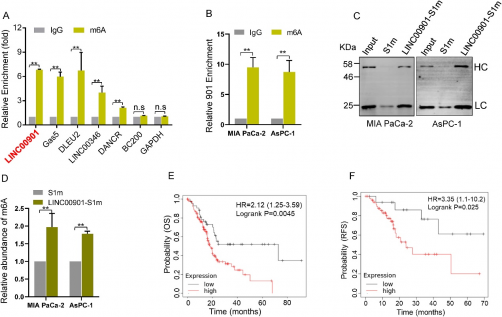RNA molecules can undergo chemical changes like m6A, which can significantly influence gene expression and affect several aspects of cancer development and progression. While studies on the m6A alteration of messenger RNA (mRNA) have been considerable, less is known about how it affects lncRNAs, particularly in the context of PDAC.
 LINC00901 is an m6A-modified lncRNA and its high level is associated with poor prognosis of PDAC patients. Image Credit: Genes & Diseases
LINC00901 is an m6A-modified lncRNA and its high level is associated with poor prognosis of PDAC patients. Image Credit: Genes & Diseases
A team from The Children’s Hospital, Zhejiang University School of Medicine, People’s Hospital of Hangzhou Medical College, and University of Mississippi Medical Center used a novel method called methylated RNA immunoprecipitation (MeRIP) to investigate the function of LINC00901, a long noncoding RNA (lncRNA) modified by the amino acid m6A, in promoting the growth, survival, and invasiveness of pancreatic ductal adenocarcinoma (PDAC) cells, which leads to tumor growth.
Their findings were published in the journal Genes & Diseases.
The study makes the intriguing claim that the expression of LINC00901 is negatively regulated by the m6A reader protein YTHDF1. The group discovered two m6A sites on LINC00901 that are crucial for the protein’s communication with YTHDF1. Their relevance in LINC00901’s oncogenic activity was shown when alterations at these locations resulted in decreased interaction, underlining their function.
Additionally, the study reveals a crucial LINC00901-IGF2BP2-MYC axis that promotes PDAC development in an m6A-dependent way, revealing a possible novel treatment target.
The researchers hint at the possibility of better patient response to treatment by combining a checkpoint inhibitor with YTHDF1 impairment and indicate the m6A mechanism as a prospective therapeutic route.
Additionally, the potential of creating immunotherapies that target this pathway arises from the discovery that the m6A mutation is implicated in regulating innate and adaptive immune cells.
This study represents a substantial improvement in the understanding of how RNA modifications, like m6A, affect gene expression and support the growth of cancer.
These results provide novel insights into the role of m6A alteration in lncRNA in the context of PDAC, improving current comprehension of the course of the disease and perhaps revealing novel treatment options. Investigating this RNA alteration broadens the range of potential applications for targeted cancer treatment.
Source:
Journal reference:
Peng, W.- X., et al. (2023). N6-methyladenosine modified LINC00901 promotes pancreatic cancer progression through IGF2BP2/MYC axis. Genes & Diseases. doi.org/10.1016/j.gendis.2022.02.014